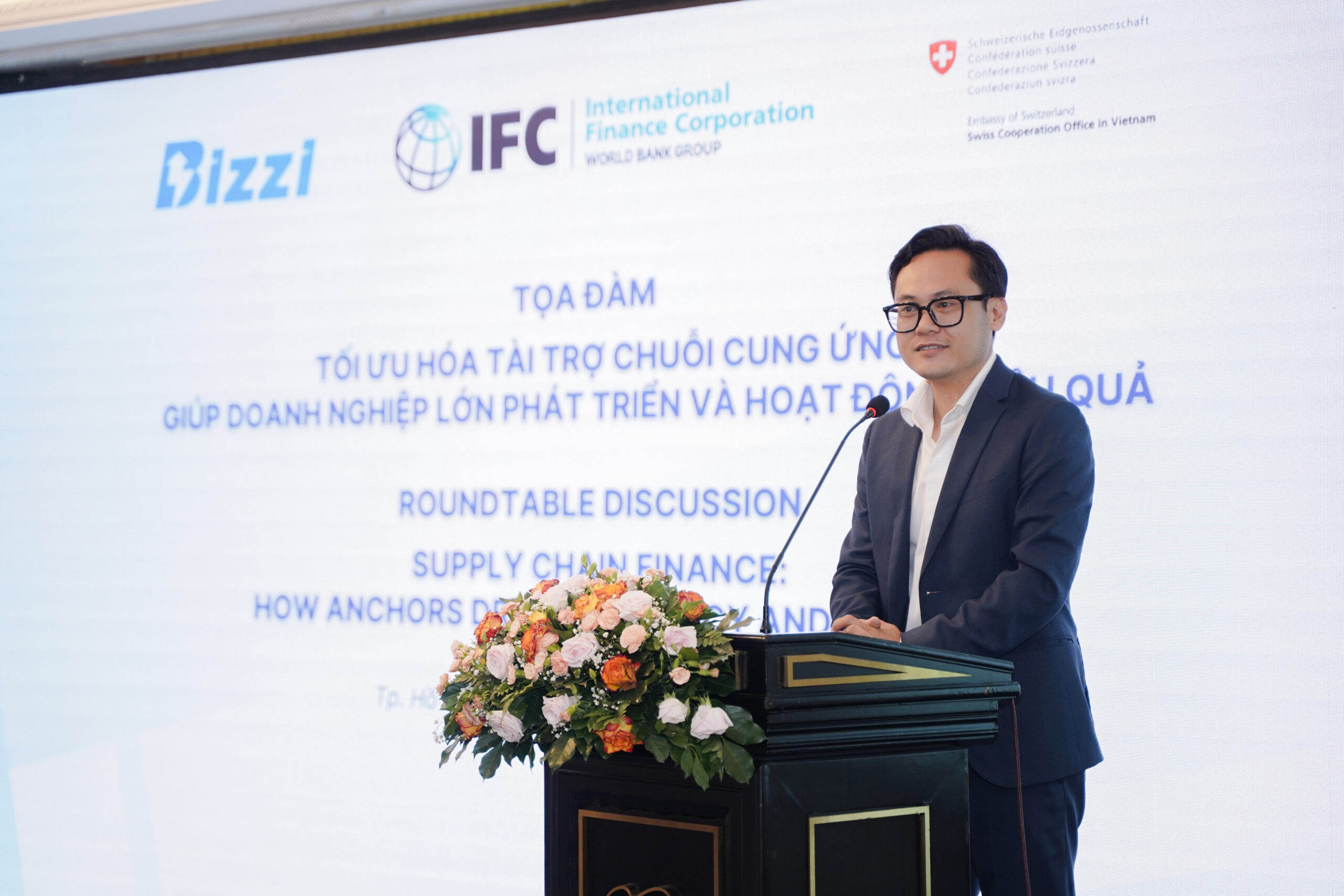Ho Chi Minh, August 15, 2025 – Bizzi Vietnam Co., Ltd. and the International Finance Corporation (IFC), a member of the World Bank Group, successfully co-organized a workshop on “Optimizing Supply Chain Finance to help large enterprises develop and operate effectively”.
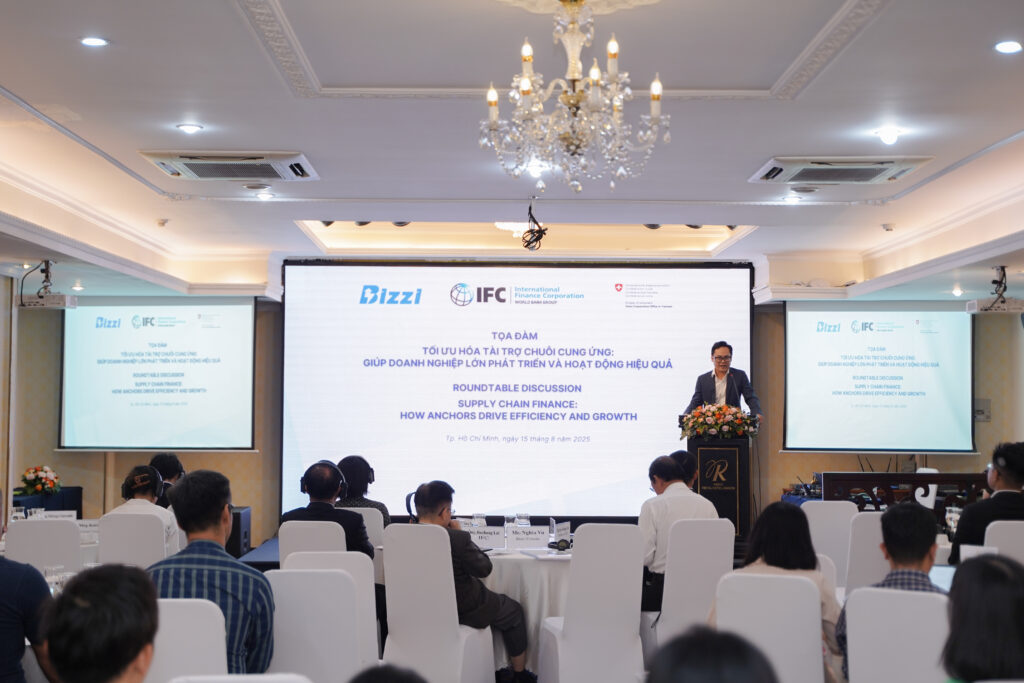
Notably, the workshop was attended by many special guests, including Mr. Jinchang Lai, senior expert of IFC - International Finance Corporation, member of the World Bank Group; Mr. Lee Kheng Leong, Consulting Director of KAPPS Consulting; Mr. Nguyen Hoang Minh, Head of Representative Office of Vietnam Banks Association (VNBA) in Ho Chi Minh City; Ms. Nana Nagai, CEO of Money Forward; Ms. Meg Koshio, Strategy Director of Money Forward Vietnam; and Mr. Shingo Sawada, Deputy Head of Strategic Partnership Department of Aozora Bank - strategic shareholder of OCB Bank.
The event also brought together many leaders of leading enterprises and leading financial institutions at home and abroad, contributing to creating a forum with depth, multi-perspective and high practicality.
The workshop was organized to provide the Vietnamese business community with a comprehensive view of trends. Supply Chain Financing (SCF), a modern financial method that improves liquidity, optimizes operations and promotes supply chain sustainability.
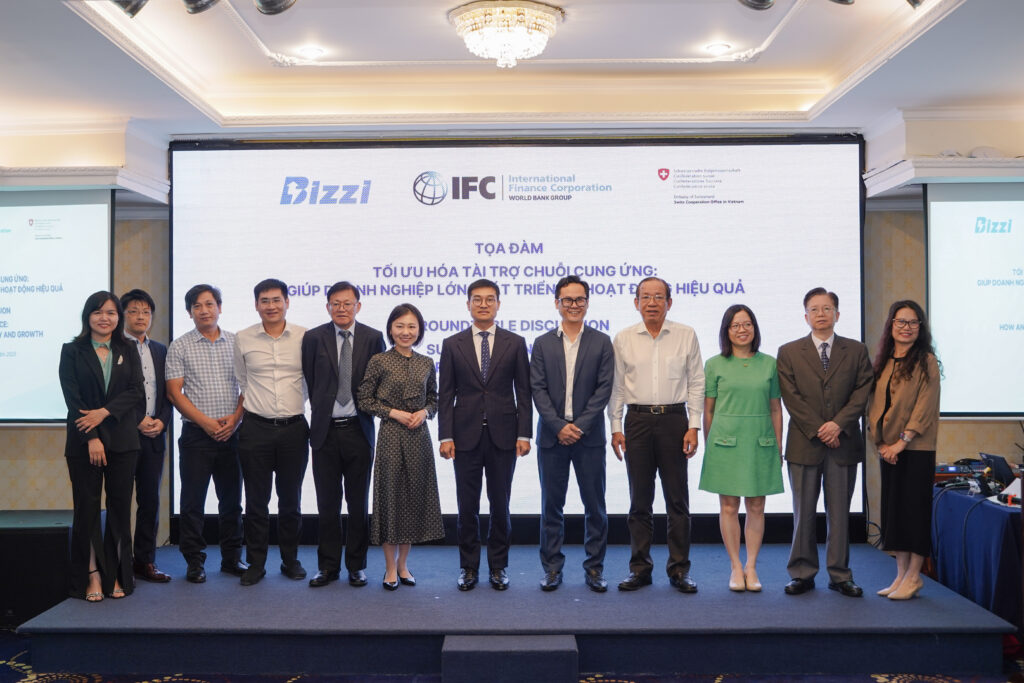
Sharing from experts and practices in Vietnam
At the workshop, experts from IFC, Bizzi and financial institutions analyzed the strong growth of the global SCF market, which reached a scale of more than 45 billion USD in 2023 and is expected to grow by 13,69%/year in the period of 2024 - 2030 and will reach 112.01 billion USD in 2023. The speakers also pointed out the opportunity for Vietnamese enterprises to take advantage of this trend in the context of Resolution 68/NQ-TW and the strategy of building an International Financial Center in Ho Chi Minh City and Da Nang, which is creating a favorable legal environment.
This trend reflects the growing need for flexible financing solutions, especially in the context of constantly changing global supply chains. Experience from Asia-Pacific countries shows that SCF acts as a bridge between capital sources and links in the value chain, helping leading enterprises and small suppliers take advantage of credit, reduce capital pressure, maintain stable supply and increase resilience to risks.
The workshop also recorded practical experiences from pioneering domestic enterprises, affirming the potential of SCF in supporting More than 971,300 Vietnamese enterprises are SMEs Improve cash flow without collateral, enhance supplier credibility in the eyes of upstream businesses, and strengthen a supply chain ecosystem Greener, more digital and more sustainable.
Efforts to promote a sustainable digital financial ecosystem
Bizzi Vietnam representative emphasized that the workshop is not only a forum for knowledge sharing, but also the first step in strategic cooperation between Bizzi and IFC to promote transparent and digital financial solutions in Vietnam. With the advantage of automation technology and transparent data, Bizzi Committed to accompanying IFC in supporting businesses to access capital more quickly, safely and effectively.
Grandfather Vu Trong Nghia, Director and Co-founder of Bizzi Vietnam, commented: “Resolution 68-NQ/TW and the Strategy for Developing International Financial Centers in Ho Chi Minh City and Da Nang by 2025 are creating a favorable environment, helping private enterprises access capital more effectively. SCF not only helps improve cash flow but also enhances the credibility of suppliers, while strengthening supply chain linkages towards green, digital and sustainable.”
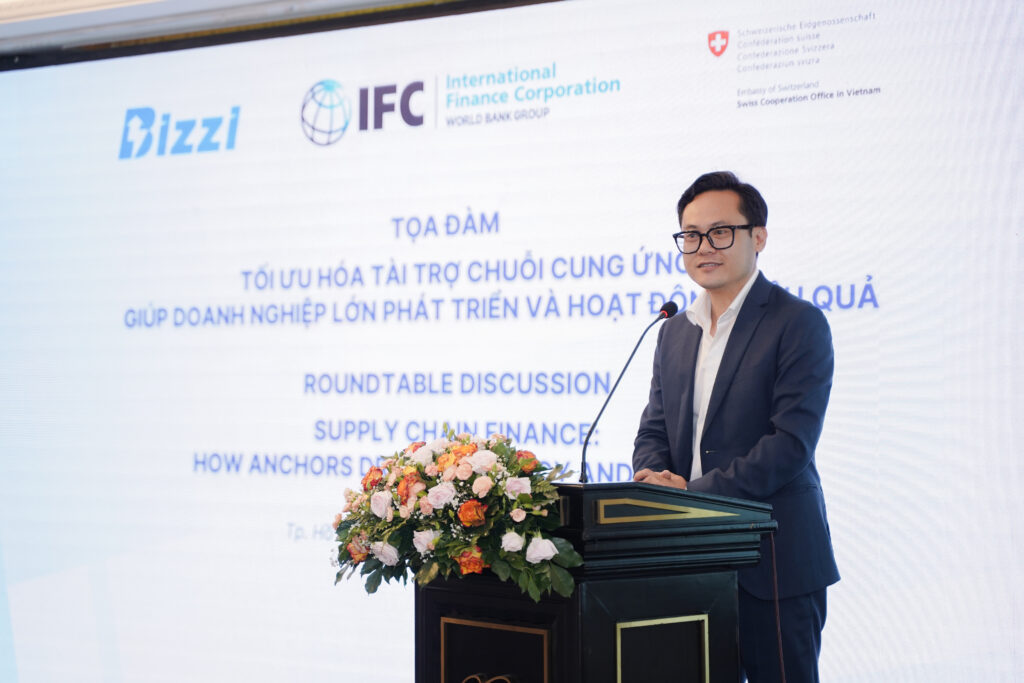
From an international perspective, he Jinchang Lai, lead expert, Head of Financial Infrastructure Development Group, Asia-Pacific, IFC Financial Institutions Advisory Group, said that SCF is not a single financial product but a comprehensive approach to corporate lending. This model leverages receivables, circulating goods and relationships in the supply chain to provide financial services, protecting the interests of suppliers while helping core businesses optimize cash flow.
“For enterprises at the beginning of the chain, SCF allows for extending payment periods without affecting suppliers; at the same time, it helps shorten debt collection time from customers or distributors, and reduces inventory through the ‘just-in-time’ production and delivery mechanism when there is an effective chain management system,” Mr. Lai emphasized.

But, he Kheng Leong Lee, consulting director of KAPPS Consulting, emphasized that the success of SCF depends largely on the level of cooperation and commitment of the parties involved in the chain. “If the leading enterprise in the chain takes the initiative to lead, it will be easier for banks and suppliers to build trust and implement SCF effectively. This is a win-win model in which all parties benefit: large enterprises improve their partnerships, suppliers access cheaper capital, and banks have more data to manage risks,” Mr. Lee shared.

Technology plays a key role
A key highlight of the workshop was the role of technology in realizing the benefits of SCF. Experts said that an effective electronic SCF platform must enable rapid credit provision, transaction data authentication, credit information lookup, and integrate data analytics to combat fraud and quantify risk.
The new trend in the world is to integrate ESG data into the financing valuation process, to encourage businesses to operate sustainably, be environmentally friendly and meet increasingly stringent requirements from the international market.
A concrete demonstration of the potential of SCF is the product Electronic factoring of Electricity Finance Joint Stock Company (EVNFinance) deployed on the Bizzi platform. According to him Mai Danh Hien, Member of the Board of Directors, General Director of EVNFinance, in the context of many economic fluctuations, Vietnamese SMEs still face the problem of working capital and limitations in collateral assets - major barriers to growth.
SCF solutions, especially electronic factoring on digital platforms, help connect capital from financial institutions to the right link in the value chain that needs support. Although newly deployed, since the beginning of the year, this product has disbursed more than 315 billion VND, showing that the market potential is still very large.

There is still much room for development.
According to estimates, the potential of the SCF market in Vietnam is up to 121 billion USD, equivalent to approximately 15% GDP. However, the annual SCF trading volume is still quite modest. Ms. Ha Nguyen, Head of Supply Chain Finance at Bizzi Vietnam, pointed out many reasons: most small and medium enterprises still lack connectivity and comprehensive digitalization of the supply chain; banks are still afraid of risks and lack motivation to develop SCF; the legal framework is not really clear.
In addition, the lack of credit records, collateral, slow payment and lack of strong commitment from leading enterprises in the chain prevent SCF from reaching its full potential.
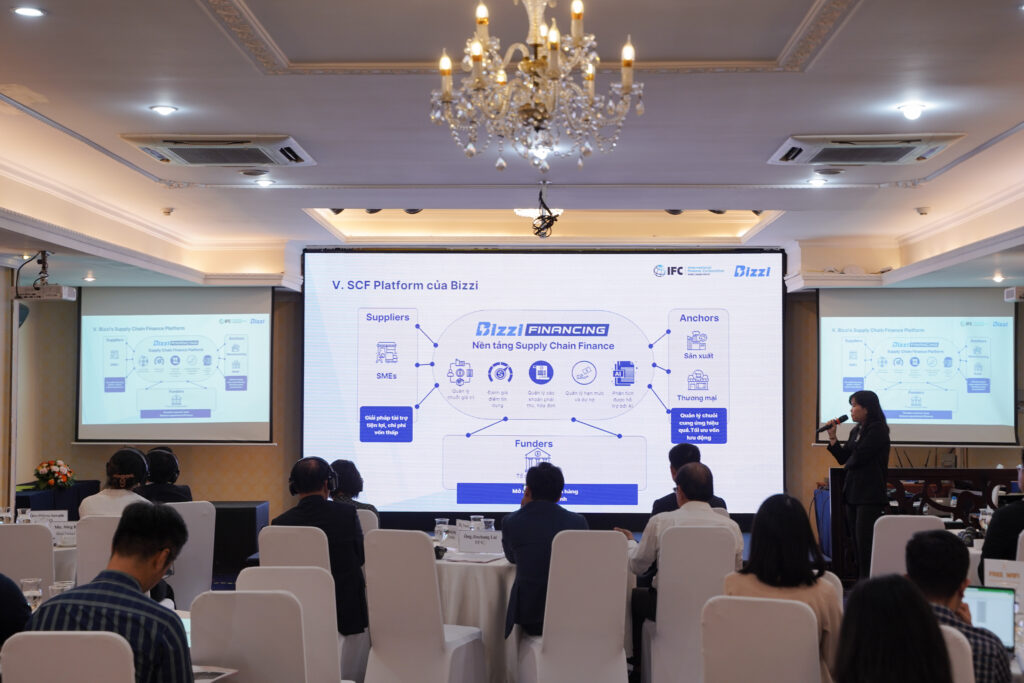
According to experts, with the support of major policies such as Resolution 68-NQ/TW, the strategy to build an International Financial Center in Ho Chi Minh City and Da Nang, along with the rapid completion of domestic financial technology infrastructure and the support of international organizations such as IFC, Vietnam is facing Golden opportunity to thrive Supply Chain Finance (SCF).
If deployed synchronously, SCF will not only help businesses improve cash flow, but also contribute to building a supply chain. greener, more digital and more transparent, increasing resilience to global fluctuations, while enhancing the export competitiveness of Vietnamese enterprises in the international market.
In the context of deep integration, a transparent, flexible and sustainable digital financial ecosystem will become the foundation for Vietnamese enterprises to participate more deeply in the global value chain.
Bizzi Vietnam representative affirmed that they will continue to invest in technology, develop automation platforms and transparent data, aiming to bridge the gap between businesses - suppliers - financial institutions. IFC also committed to accompanying in sharing international experiences, promoting legal frameworks and SCF models suitable to the characteristics of the Vietnamese market.
Meanwhile, EVNFinance and other credit institutions expressed their readiness to deploy supply chain financing products on digital platforms, aiming to bring practical benefits to small and medium enterprises - a group accounting for 97% of the total number of Vietnamese enterprises.
The workshop ended with many lively exchanges between speakers and participating businesses, opening up new cooperation prospects, while affirming the determination to join hands to build a sustainable supply chain finance ecosystem for Vietnam in the coming period.
